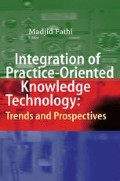Abstract
Business process management (BPM) is a key managerial approach to improve competitiveness and organizational performance. The paper addresses the knowledge management aspects of BPM. Starting from several outcomes of process modeling, job role and position related competences, IT requirement specification, organizational learning and knowledge transfer, the common ground of knowledge management, semantic technologies and business process modeling will be discussed. The questions to be answered: how can process models be utilized and integrated with Knowledge Management Systems (knowledge representation, semantic technologies)? How can the knowledge transfer activities be supported, that are central issues in BPM initiatives? How can Knowledge Management Systems (KMS) underpin the long term sustainability and institutionalization of BPM based innovations? Is there a role of process-oriented KMS in BPM-related system development projects? The paper will give an overview of the “big picture” and also outlines a few applications as proof of concept. The final conclusion leads to a high level model and approach that can be used to harmonize BPM initiatives with KM concerns.
Access this chapter
Tax calculation will be finalised at checkout
Purchases are for personal use only
Preview
Unable to display preview. Download preview PDF.
References
Stewart, R.: Managing Today & Tomorrow, pp. 147–190. Macmillan (1991)
Hammer, M.: Reengineering Work: Don’t Automate. Obliterate. Harvard Business Review 68(4), 104–112 (1990)
Davenport, T.H., Short, J.E.: The New Industrial Engineering: Information Technology and Business Process Redesign. Sloan Management Review, 11–27 (Summer 1990)
Hall, G., Rosenthal, J., Wade, J.: How to Make Re-engineering Really Work. Harvard Business Review, 119–131 (November-December 1993)
Anonymous: ARIS Value Engineering-Concept. Whitepaper. IDS Scheer AG (June 2005), http://www.sdn.sap.com/irj/scn/go/portal/prtroot/docs/library/uuid/eae8e311-0b01-0010-0f9c-8d26e2714a91?QuickLink=index&overridelayout=true&5003637725232
Hepp, M., Hinkelmann, K., Karagiannis, D., Klein, R., Stojanovic, N.: Proceedings of the Workshop on Semantic Business Process and Product Lifecycle Management (SBPM 2007) 3rd European Semantic Web Conference (ESWC 2007), Innsbruck, Austria (June 7, 2007), http://www.heppnetz.de/files/SBPM2007_Proceedings_A4.pdf
Cardoso, J., Hepp, M., Lytras, M.D.: The Semantic Web: Real-World Applications from Industry. Springer (2007) ISBN: 0387485309
Kramler, G., Murzek, M.: Business Process Model Transformation Issues (2006)
Ildikó, S.: Comparing The Competence Contents of Demand and Supply Sides on the Labour Market. In: 33rd International Conference on Information Technology Interfaces, Cavtat, Croatia (2011)
Bálint, M., Andrea, K., Péter, F., András, G.: Advisor - How can we support the employee and the employer in fringe benefit construction? In: Second European Conference on Knowledge Management, UK, Dublin (2001)
Andrea, K., Zoltán, S.: The Value to Knowledge Management Using IT Standards - Assessment and Audit Issues of the Knowledge Management Applications Development. In: The 7th European Conference on Knowledge Management, Budapest, September 4-6 (2006), http://www.academic-conferences.org/pdfs/eckm06-proceedings_booklet.pdf
Vas, R.F., Kovács, B., Kismihók, G.: Ontology-based Mobile Learning and Knowledge Testing. International Journal of Mobile Learning and Organization 2, 128–147 (2009)
Kismihók, G., Kovács, B., Vas, R.F.: Integrating Ontology-based Content Management into a Mobilized Learning Environment. In: Caballé, S., Xhafa, F., Daradoumis, T., Juan, A.A. (eds.) Architectures for Distributed and Complex M-Learning Systems: Applying Intelligent Technologies, pp. 192–210. IGI Global, Hershey (2009)
Gábor, A., Szabó, Z.: Noisy Reform or Silent Revolution in the Higher Education? A Hungarian Overview. In: Cunningham, P., Cunningham, M. (eds.) eAdoption and the Knowledge Economy: Issues, Applications, Case Studies, pp. 1774–1780. IOS Press, Amsterdam (2004)
Gábor, A., Szabó, Z.: Knowledge based institutional capacity building in the Hungarian Higher Education. In: Berdai, A., Sekhari, A. (eds.) The Proceeding of the International Conference on Software, Knowledge and Information Management and Applications (SKIMA 2009), Fez, Morocco, October 21-23, pp. 78–85 (2009) ISBN: 9781851432516
Kő, A., Gábor, A., Kovács, B.: Agile Knowledge-Based E-Government Supported By Sake System. Journal of Cases on Information Technology (JCIT) 3, 1–20 (2011)
Kovács, B.: Improving Content Management - a Semantic Approach. Acta Cybernetica 4, 579–593 (2008)
Vas, R., Kovács, B.: Ontology-based Content Management Systems in Public Administration. In: Schweighofer, E. (ed.) Legal Informatics. The LEFIS Series, vol. 2, pp. 45–62. Prensas Universitarias de Zaragoza, Zaragoza (2008)
Ternai, K.: A New Approach in the Development of Ontology Based Workflow Architectures. In: 17th International Conference on Concurrent Enterprising, Aachen, Germany, June 20-22 (2011)
Ternai, K., Török, M.: Semantic modeling for automated workflow software generation – An open model. In: 5th International Conference on Software, Knowledge Information, Industrial Management and Applications (SKIMA 2011), Benevento, Italy, September 8-11 (2011)
eBEST: Empowering Business Ecosystems of Small Service Enterprises to Face the Economic Crisis. The project co-funded by the European Commission, FP7-SME-2008-2 No. 243554. WWW page, http://www.ebest.eu/ (accessed November 2, 2011)
Kő, A., Dr. Ternai, K.: A Development Method for Ontology Based Business Processes. In: eChallenges e-2011 Conference, October 26-28 (2011)
Kismihók, G., Mol, S.: The OntoHR project: Bridging the gap between vocational education and the workplace. In: Book of Abstracts, EAWOP 2011, pp. 194–195. University of Maastricht (2011)
Author information
Authors and Affiliations
Corresponding author
Editor information
Editors and Affiliations
Rights and permissions
Copyright information
© 2013 Springer-Verlag Berlin Heidelberg
About this chapter
Cite this chapter
Gábor, A., Szabó, Z. (2013). Semantic Technologies in Business Process Management. In: Fathi, M. (eds) Integration of Practice-Oriented Knowledge Technology: Trends and Prospectives. Springer, Berlin, Heidelberg. https://doi.org/10.1007/978-3-642-34471-8_2
Download citation
DOI: https://doi.org/10.1007/978-3-642-34471-8_2
Publisher Name: Springer, Berlin, Heidelberg
Print ISBN: 978-3-642-34470-1
Online ISBN: 978-3-642-34471-8
eBook Packages: EngineeringEngineering (R0)

